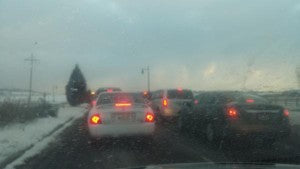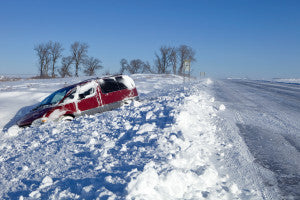For Thanksgiving, my brother-in-law, his wife, and a few cousins drove from Utah to California to visit family for the holiday. As they were driving back to Utah the following Sunday, the weather turned sour. It wasn’t snowing heavily – just light rain and sleet, according to my brother-in-law – but that didn’t stop a wreck from happening 80 miles away from their home.

Fortunately they weren't involved, but traffic was at a standstill. They would later discover that a semi-truck had jackknifed on the freeway, blocking all lanes. My brother-in-law took a side road – along with everyone else on the freeway – in order to get around the accident. As it turned out, traffic slowed to a crawl – and then full on stop – on that road as well. They moved six miles in an hour and a half. It was 8:00 at night, and they had work and school the next day.
Later, they learned what had caused the stoppage on the access road – another semi-truck had jackknifed.
Such experiences can be very frustrating. Fortunately, they all made it back safe and sound. The only casualty was a bit of sanity and some much needed sleep. But they’re alright, and that’s what matters.
Winter has arrived here in Utah, and if it hasn’t arrived for you yet, it could very soon.
We talk a lot about preparing your home and food storage for emergencies and disasters (which also includes winter), but today we’d like to help you get your car ready for winter driving conditions.
First off, how’s your car’s emergency kit? Just like in your home, your car should be prepared with the essentials, just in case you slide off the road or are otherwise stranded in the cold.
Ready.gov has a list of necessary items for your car’s kit. Some of those include the following:
- Shovel
- Windshield scraper
- Flashlight
- Water
- Snack food
- Blankets and warm clothing
- Road salt/sand
- Booster cables
These are some of the basic necessities that need to go with you wherever you travel throughout the winter. Of course, you may have special circumstances and needs which you should prepare for as well, such as medications, pet supplies, or other such items.
Thinking back on the experience of my brother-in-law, what might have happened if they had things not worked out for them? My first thought is gas.
What would their trip home have been like if their gas tank had been low going into that traffic jam? During a chilly winter night, they could have been stuck without heat. Blankets, hats, mittens, and other warm clothing would have been a very welcomed resource in that situation. Fortunately, their gas tank was full enough until they could reach the next town (the towns are spread out quite far in the area in which they were stuck, so things could have been a lot worse).

If they had been stuck on the road, snacks and water would not only do wonders for their morale, but help keep them hydrated, alert, and functioning properly in the event they needed more than just corn ships. Flashlights would have been useful in checking under the hood in case of car trouble (or having light by which passengers could read while they wait). A traffic jam is one thing. Sliding off the road in the middle of nowhere and having to wait for help to arrive would certainly require an emergency stash of gear.
And the list goes on.
You see, we never can plan for disasters (including two jackknifed trucks blocking two roads on one trip). That’s why it’s so important to have emergency gear and supplies in your car. The example scenarios above are only meant to give a hint of what could have been – the possibilities of what could have happened are many.

 Fortunately they weren't involved, but traffic was at a standstill. They would later discover that a semi-truck had jackknifed on the freeway, blocking all lanes. My brother-in-law took a side road – along with everyone else on the freeway – in order to get around the accident. As it turned out, traffic slowed to a crawl – and then full on stop – on that road as well. They moved six miles in an hour and a half. It was 8:00 at night, and they had work and school the next day.
Later, they learned what had caused the stoppage on the access road – another semi-truck had jackknifed.
Such experiences can be very frustrating. Fortunately, they all made it back safe and sound. The only casualty was a bit of sanity and some much needed sleep. But they’re alright, and that’s what matters.
Winter has arrived here in Utah, and if it hasn’t arrived for you yet, it could very soon.
We talk a lot about preparing your home and food storage for emergencies and disasters (which also includes winter), but today we’d like to help you get your car ready for winter driving conditions.
First off, how’s your car’s emergency kit? Just like in your home, your car should be prepared with the essentials, just in case you slide off the road or are otherwise stranded in the cold. Ready.gov has a list of necessary items for your car’s kit. Some of those include the following:
Fortunately they weren't involved, but traffic was at a standstill. They would later discover that a semi-truck had jackknifed on the freeway, blocking all lanes. My brother-in-law took a side road – along with everyone else on the freeway – in order to get around the accident. As it turned out, traffic slowed to a crawl – and then full on stop – on that road as well. They moved six miles in an hour and a half. It was 8:00 at night, and they had work and school the next day.
Later, they learned what had caused the stoppage on the access road – another semi-truck had jackknifed.
Such experiences can be very frustrating. Fortunately, they all made it back safe and sound. The only casualty was a bit of sanity and some much needed sleep. But they’re alright, and that’s what matters.
Winter has arrived here in Utah, and if it hasn’t arrived for you yet, it could very soon.
We talk a lot about preparing your home and food storage for emergencies and disasters (which also includes winter), but today we’d like to help you get your car ready for winter driving conditions.
First off, how’s your car’s emergency kit? Just like in your home, your car should be prepared with the essentials, just in case you slide off the road or are otherwise stranded in the cold. Ready.gov has a list of necessary items for your car’s kit. Some of those include the following:
 If they had been stuck on the road, snacks and water would not only do wonders for their morale, but help keep them hydrated, alert, and functioning properly in the event they needed more than just corn ships. Flashlights would have been useful in checking under the hood in case of car trouble (or having light by which passengers could read while they wait). A traffic jam is one thing. Sliding off the road in the middle of nowhere and having to wait for help to arrive would certainly require an emergency stash of gear.
And the list goes on.
You see, we never can plan for disasters (including two jackknifed trucks blocking two roads on one trip). That’s why it’s so important to have emergency gear and supplies in your car. The example scenarios above are only meant to give a hint of what could have been – the possibilities of what could have happened are many.
If they had been stuck on the road, snacks and water would not only do wonders for their morale, but help keep them hydrated, alert, and functioning properly in the event they needed more than just corn ships. Flashlights would have been useful in checking under the hood in case of car trouble (or having light by which passengers could read while they wait). A traffic jam is one thing. Sliding off the road in the middle of nowhere and having to wait for help to arrive would certainly require an emergency stash of gear.
And the list goes on.
You see, we never can plan for disasters (including two jackknifed trucks blocking two roads on one trip). That’s why it’s so important to have emergency gear and supplies in your car. The example scenarios above are only meant to give a hint of what could have been – the possibilities of what could have happened are many.



1 comment
J Allen
I’m always concerned about being trapped in a car. I am especially so in winter and when I’m in other people’s cars. I always carry preps but there is a conflict with my desire to keep my car uncluttered.
One thing about flashlights. Summer heat is very hard on batteries. Every time I’ve put a flashlight in my car, it was dead the first time summer sun hit my car. Because of that, I carry a 12 volt light, that is part of my tire pump. The car batter is far less likely to be dead. Plus, just about every cell phone has a flashlight app now, as a backup.